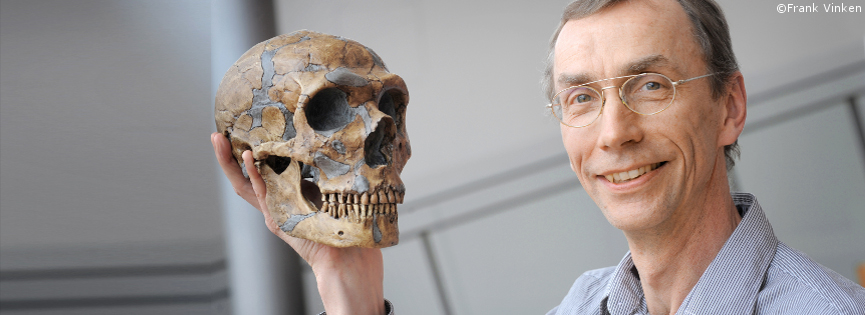You are in:
Laureates
Start of main content
Svante Pääbo
Princess of Asturias Award for Technical & Scientific Research 2018

Svante Pääbo (Stockholm, 20th April 1955) studied History of Science, Egyptology, Russian and Medicine at the University of Uppsala and was a researcher at the Department of Cell Biology, where he earned his PhD in 1986. He undertook postdoctoral research at the Institute of Cellular Biology II, University of Zurich, the Imperial Cancer Research Fund in London and the University of California at Berkeley. He was Full Professor of General Biology at the University of Munich between 1990 and 1998, and has been Honorary Professor of Molecular Evolutionary Biology at the University of Leipzig (Germany) since 1999. He has likewise been Director of the Max Planck Institute for Evolutionary Anthropology in Leipzig since 1997.
Considered one of the founders of palaeogenetics, Svante Pääbo has led the project to completely sequence the genome of Neanderthals, a species that became extinct approximately 30,000 years ago, the draft of which was published in the May 2010 issue of the journal Science and whose definitive results were presented and made available to the international scientific community in March 2013. Pääbo demonstrated in the 1980s that it was possible to analyse the DNA of Egyptian mummies and continued working on establishing rigorous methods to recover ancient DNA sequences, a task complicated by degradation and modification by chemical processes that can lead to errors during replication of the sequences. His methodology has been used to study the phylogeny and genetics of populations of extinct animals, such as mammoths, terrestrial sloths, cave bears and moas. In 1997, Pääbo managed to recover mitochondrial DNA sequences from samples of a Neanderthal-type specimen, which was the first time that molecular genetic data were extracted from a hominin fossil. In 2004, he adapted and applied high-performance DNA sequencing techniques to ancient DNA, which opened up the possibility of analysing the entire genome of extinct organisms.
The following year, he set up the Neanderthal genome sequencing project, the draft of which was presented in 2010 and its final version, in 2013. While studying some remains from Siberia as part of this project, he discovered a new type of hominin unknown until that time, which has been named Denisovan (after the name of the cave where the remains were found), the first extinct hominin to be exclusively described through genetic data. He showed that Denisovans contributed 5% to the genome of current inhabitants of Australia and other areas of Oceania. From the results of his Neanderthal genome project, for which he analysed remains not only from Siberia, but also from sites in Vindija (Croatia) and El Sidrón (Spain), it was discovered that 2% of the genome of modern non-African humans comes from Neanderthals. The explanation for these results is that the cross between the two species could have occurred after the first modern humans left Africa and met the Neanderthals, probably in the Near East. The cross between the different Homo species is reflected in the genetic legacy that Neanderthals and Denisovans have left in modern Homo sapiens. In his book Neanderthal Man. In Search of Lost Genomes (2014), Pääbo tells the history of the sequencing of this extinct species from a personal point of view.
Member of the European Molecular Biology Organization (EMBO), the Academia Europaea, the US National Academy of Sciences and The Royal Society of London (2011 Prince of Asturias Award for Communication and Humanities), among other such institutions, Svante Pääbo has received honorary degrees from several universities. Among other distinctions, he has received the Louis Jeantet Prize for Medicine (Switzerland, 2005), the Kistler Prize (USA, 2009), the Gruber Genetics Prize (USA, 2013), the Breakthrough Prize in Life Sciences (USA, 2015), the Keio Medical Science Prize (Japan, 2016), the Dan David Prize (Israel, 2017) and the Human Frontier Science Program Nakasone Award (2018). He also holds the Theodor Bücher Medal from the European Federation of Biochemical Societies and HM The King of Sweden’s Medal.
End of main content
Sección de utilidades
Fin de la sección de utilidades
- Legal document Legal document (Access key 8)
- | Privacy policy Privacy policy (Access key )
- | Social networks ???en.portal.pie.menu107.title???
- | Cookies ???en.portal.pie.menu110.title???
- | Site map Site Map (Access key 3)
- | Contact Contact (Access key )
- | XHTML 1.0
- | CSS 2.1
- | WAI 'AA
© Copyright 2024. FUNDACIÓN PRINCESA DE ASTURIAS
 MINUTES OF THE JURY
MINUTES OF THE JURY


